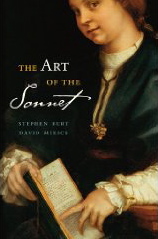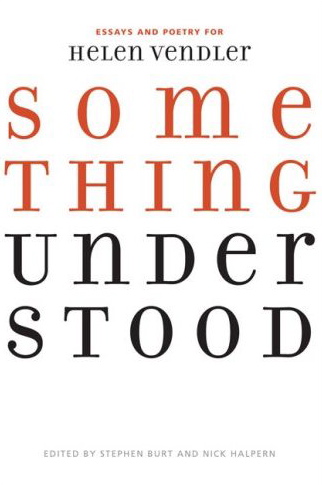(Cross-posted from Harriet.) It is a lucky thing, but also a bit of a melancholy thing, to write about contemporary poetry as I do, as often as I do: having written about living poets– sometimes at length, and sometimes for the sort of periodicals that have dozens of footnotes, and sometimes for the sort of periodicals that actually pay you– since 1994, I now get a lot of poetry books in the mail, from a lot of presses– from perhaps half the US presses (air mail is another matter!) whose books I would try to read anyway. In good weeks I’m simply grateful for the in-flow: surely I could not have bought all those books myself, and one in any given stack is going to have something memorable, exceptional, perhaps by a first-book writer whose name I’ve never heard, or a second-book writer whose volume I would never have seen (this year for some reason they’re most often prose-poem writers: Brian Johnson, Carol Guess, Alison Benis White, among others). But in bad weeks I’m almost overwhelmed: how can I give every one of these books a fair chance? How can I take each one of these books quite as seriously as I would had it been given me by a friend, had I sought it and bought it in an independent store? Of course I can’t— but I can try; and yet the effort, on alternate afternoons, can bring me something close to new-book burnout.
Which is a reason to be grateful for other art forms that use words well (the last Atmosphere CD, for instance), and even more grateful for the little magazines, the ones I used to think would get driven to extinction by their no-capital-expenses, no-dead-tree counterparts on the Internet. Today I think instead that the best “little magazines” are where I go when I want to read contemporary poetry and, at the same time, escape poetry fatigue, escape the problem of having to judge a new book or an author almost as soon as I crack the cover: magazines give poems, not poets, and they let me enjoy new poems one or two at a time.
Here, then, are three very good new little magazines, two out of three, I ought to admit, published by people I know: The Hat, from New York, is all poetry or prose-poetry, with an eclectic verve in which we might detect New York School origins. It leads off with Nico Alvarado-Greenwood’s joke pseudo-cento (“When I have fears that I may run out of bacon,/ I sing of brooks, of bloosoms, birds and bacon.// Bacon, friends, is delicious. We must say so”), in which the pleasure involves spotting the sources (I got all but one), but it then opens into more complex delights: Becca Klaver, whose name I recognized as an organizer of poetry events at the U of Chicago, contributes the haunting-flirtatious “Fabulists in Love” (“All talk was pillow talk, on our backs imagining glow-in-the-dark stars”). Ange Mlinko, whose poems make more and more sense the more you reread them (without abandoning their bizarries) has a troika, including “Colostrum in Lent.” John Olson, also a novelist, offers highly colored, even jeweled, prose poems. And Andrew Sage, whose name I had never seen before, makes a beautiful, slightly old-fashioned poem (John Koethe came faintly to mind) with riffs on the children’s classic The Snowy Day.
The Laurel Review has been going for a while (its scope is American, its address Missourian) but I only found out about it when its editor, the poet John Gallaher, sent me the current all-poetry issue. It’s all over the place, in terms of styles and sources (though I suppose it excludes avant- and “new formal” extremes) and that’s the pleasure in reading it: it’s got Laura Kasischke, whom I almost always like, and Arielle Greenberg, whom I always read and whose discursive epithalamium here I found startling and moving, having once been asked to write an epithalamium myself. I did it, but hers is funnier, more profound, and better: “You know now this is what marriage is strung from, all these fragrant, rippable leaves at the start,/ and how easily it can be moved to a bad neighborhood with no taxis,/ so then you just stop going out except to the one place to eat you really do love.” Among writers I didn’t know, or didn’t previously follow, I liked Dana Roeser’s halting semi-narrative excursus; Cynthia Cruz’s terse, raw, rhymeless sonnets (“I have this fever,// I can’t tell anyone. But I promise I will/ Love anyone// Who will talk to me”) and Arthur Vogelsang’s “Arthur Rimbaud.”
And, and, and, and finally: The Poker, edited intermittently and smartly by the poet Dan Bouchard, this tightly made and graphically unpretentious journal has on its board Jennifer Moxley and Douglas Rothschild and Kevin Davies, and if you recognize those names you know what kind of avant-garde has graced and still graces its pages; you may not know what other sorts of delights are in the current issue, number nine– prev. unpublished letters from James Schuyler and George Oppen; a wonderfully snarky experiment in writing for an inappropriate audience by Juliana Spahr, whose recent poetry has certainly been her most interesting; a four-page poem by Laura Jaramillo that includes the spot-on sentence “The problem with Marxist-Leninsts is they ask you/ constantly/ to make films for the revolution”; Charles North, from New York, whose poems don’t turn up every day; George Stanley, from Vancouver; and, um, a couple of poems by me. But that’s not why it matters. You can read more about older issues of The Poker, and click on a link to email the editor, at this website for Duration Press, though I’m not sure the PO Box listed still works: I strongly advise you to email the editor instead, and he’ll tell you where to send your (I think it’s still) $10.
And if you have read this far and you’re in NYC, you might want to see me read tomorrow, June 3.








